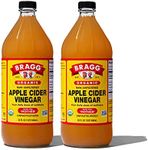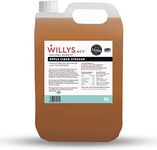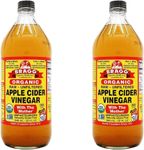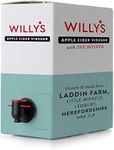Buying Guide for the Best Apple Cider Vinegars
Choosing the right apple cider vinegar can be a bit overwhelming given the variety of options available. Apple cider vinegar is known for its health benefits, including aiding digestion, weight loss, and improving skin health. When selecting the best apple cider vinegar for your needs, it's important to consider several key specifications to ensure you get a product that meets your expectations and health goals.Raw vs. PasteurizedRaw apple cider vinegar is unfiltered and unpasteurized, meaning it contains the 'mother' – strands of proteins, enzymes, and friendly bacteria that give the vinegar a murky appearance. This type is often preferred for its potential health benefits. Pasteurized apple cider vinegar, on the other hand, is filtered and heated to kill bacteria, resulting in a clearer liquid. If you're looking for maximum health benefits, raw vinegar is the way to go. However, if you prefer a cleaner taste and appearance, pasteurized might be better for you.
Organic vs. Non-OrganicOrganic apple cider vinegar is made from organically grown apples and is free from synthetic pesticides and fertilizers. This can be important for those who are concerned about consuming chemicals or supporting sustainable farming practices. Non-organic vinegar may be more affordable but could contain residues from pesticides. If you prioritize health and environmental sustainability, organic is the better choice. If cost is a concern, non-organic might be suitable.
Filtered vs. UnfilteredFiltered apple cider vinegar has been processed to remove the 'mother' and any sediment, resulting in a clear liquid. Unfiltered vinegar retains the 'mother' and sediment, which some believe enhances its health benefits. If you want a product with potential added health benefits, go for unfiltered. If you prefer a cleaner appearance and taste, filtered is the better option.
Acidity LevelThe acidity level of apple cider vinegar is typically around 5%, which is standard for most vinegars. This level of acidity is effective for preserving the vinegar and providing its characteristic tangy flavor. If you have sensitive digestion or are using the vinegar for specific health reasons, you might want to look for a product with a slightly lower acidity. For general use, the standard 5% acidity is usually sufficient.
PackagingApple cider vinegar is available in various types of packaging, including glass bottles and plastic containers. Glass bottles are often preferred because they do not leach chemicals into the vinegar and are more environmentally friendly. Plastic containers can be more convenient and less prone to breaking. If you are environmentally conscious or prefer a product free from potential contaminants, choose glass. If convenience and durability are your priorities, plastic might be more suitable.















